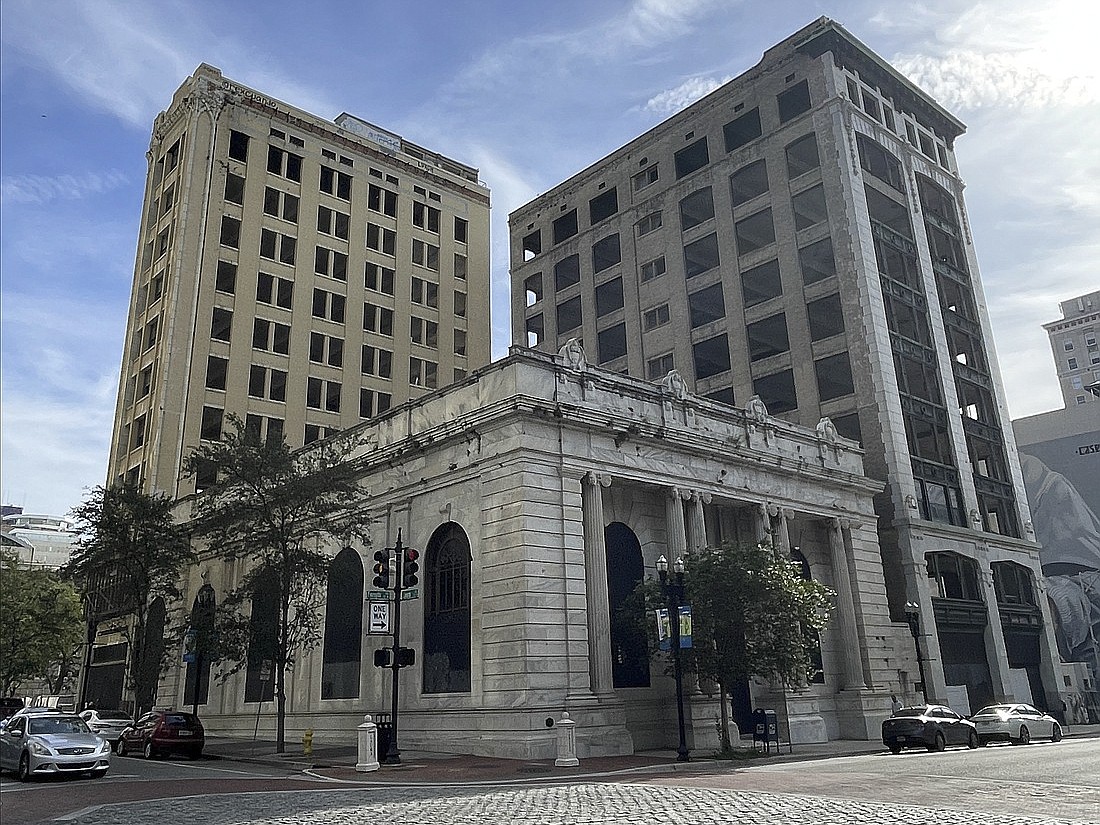
Live Oak Contracting has reached an agreement to purchase the Laura Street Trio of historic buildings in Downtown Jacksonville from longtime owner Steve Atkins, Live Oak’s president and CEO told City Council members Jan. 14.
Live Oak’s Paul Bertozzi said his company entered into a purchase and sale agreement with SouthEast Development, led by Atkins, on the long-vacant structures at Laura and Forsyth streets.
Bertozzi said he expected the sale to close within 45 days.
In November 2024, Bertozzi told Council members his company and SouthEast were negotiating the sale. That announcement came after Mayor Donna Deegan’s office announced that the city administration was cutting off conversations with Atkins and SouthEast after being unable to reach a redevelopment agreement.

On Nov. 14, 2024, the city refiled a foreclosure lawsuit naming SouthEast-affiliated Laura Trio LLC and Red Oak Capital Fund II LLC as defendants. In the suit, the city says Laura Trio LLC, the owner of the buildings, owes the city $827,500 in fines for municipal code violations.
Red Oak Capital Fund II LLC is part of Charlotte, North Carolina-based Red Oak Capital Holdings. Red Oak is a commercial real estate financing and investment company.
Live Oak’s involvement prompted the city administration to propose an agreement that would pause the city’s suit for up to 48 months in exchange for a commitment to Live Oak to correct the code violations during that time.
That proposal was designed to allow Live Oak, which is based Downtown in offices with a view of the Trio, to obtain private financing to facilitate the sale.
On Jan. 14, Deegan chief of staff Mike Weinstein said the city planned to meet with Live Oak to revisit the deal on the lawsuit. He said both parties had already agreed in principle to the terms.
“There’s nothing in the way of us redoing that lien situation with new dates,” he said.
The agreement between Live Oak and SouthEast could constitute a breakthrough in a long-running drama over whether the buildings would be redeveloped or fall victim to decay or demolition.
Twice, Council approved incentives for Atkins to resurrect the buildings only to watch the buildings continue to deteriorate.
In 2017, Council OK’d $5.8 million in public incentives toward a $44.6 million project that included only the restoration of the historic buildings. In 2021, the Council-approved incentive amount increased to $26.6 million for a $70.4 million version of the redevelopment that included new construction for a Marriott Autograph Collection hotel.
In 2023, SouthEast returned with a request for $63.5 million in incentives for updated plans that added new construction for 149 apartments with market rate and workforce housing units. The price tag for that version of the project was $175 million.
In June 2023, the Downtown Investment Authority board voted 5-1 to send a term sheet for that version of the project to Council with neither a recommendation for or against it. DIA staff reported at the time that SouthEast did not meet certain DIA criteria for incentives, including the level of private investment and the return on public investment.
After rejecting legislation aimed at moving the project forward, Council voted in January 2024 to send the issue back to the DIA.
That prompted another round of negotiation in which the total cost of the project rose to $191.2 million and SouthEast’s requests for incentives climbed to $87.2 million.
As the asks for incentives went up, Atkins faced rising concerns among city leaders that he was not bringing enough private capital to the project and that his requests for public funding would put the city at increasingly outsized financial risk.

Those concerns were eased in August 2024 when Live Oak announced that it had partnered with Atkins and SouthEast in the project, sparking hope Atkins had found a private source of funding that would make the project financially viable.
Those hopes fell apart in October when the development team came back with a proposal that included a request for $96.8 million in city incentives. The overall investment in the proposal went up as well, to $211.7 million.
After the potential sale to Live Oak was announced, Bertozzi told Council members his principal lender had requested that the agreement be completed by the end of the year.
After the Jan. 14 meeting, he said the extra time it took to reach the agreement would not affect his financing.
A finalized purchase by Live Oak and an agreement with the city over the foreclosure lawsuit wouldn’t necessarily put the project fully on track. But it would open the door to another round of negotiations on a city incentives package and redevelopment deal.
The Trio comprises the First National Bank Building, Bisbee Building and Florida Life Building, which were among the first structures built after the Great Fire of 1901 destroyed much of Jacksonville.
They were constructed between 1902 and 1912 and have two types of historic protections, having been designated as local historic landmarks and listed as contributing structures within the federally designated Downtown Jacksonville Historic District.